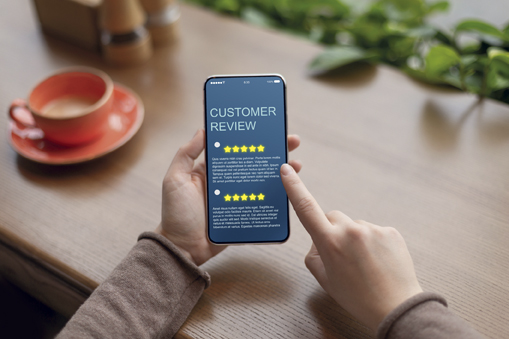Blasted Myths
By Carl Maerz
THE SIX MOST COMMON MYTHS AROUND COLLECTING GOOGLE REVIEWS
There’s more to it than just collecting reviews
Collecting Google reviews is all the rage for insurance agencies right now. Most prospects start their search for insurance online and reviews help them sort the wheat (good agencies) from the chaff (average agencies). But when it comes to the process of actually asking clients for reviews, it’s necessary to understand the nuances of how reviews work and what a successful long-term strategy looks like. Here are six of the most common industry myths around reviews that need blasted.
Myth 1: Collecting reviews alone is enough to maximize your Google page ranking. Don’t get me wrong, collecting reviews helps tremendously to increase your agency’s page ranking. But there’s a lot more you could be doing to increase the chances that your agency pops up on the first page of Google when someone in your area searches for insurance. The following may take you a couple of hours, but it’s well worth it.
Start by polishing your Google My Business profile (your agency’s account on Google). Make sure your agency’s name, address and phone number are correct. Then check on your business category. For agencies that sell P-C (both personal and commercial lines), I recommend using “insurance agency.” A common mistake is when agencies list themselves as “insurance company.” Next, add pictures to your business profile. I recommend fun pictures with your team, or whatever matches your culture. People want to know who you are, and a picture is worth a thousand words. Then, make sure your website is properly linked to your account, your hours are correct and you respond to any reviews you’ve received.
[W]hen it comes to the process of actually asking clients for reviews, it’s necessary to understand the nuances of how reviews work and what a successful long-term strategy looks like.
If you want to take it to the next level, Google ranks agencies higher if their name, address and phone number are accurate—not only on Google, but across other local online directories and search engines. But rather than going to a hundred different websites to input/update your info, look for a service that does this for you. A couple of options available online that will set you back about a hundred bucks a year are Moz Local and BrightLocal.
Myth 2: The number of reviews and star-rating are what matter most. Google reviews are great at attracting interest online. When an agency appears smack-dab on the front page of a search with five golden stars and lots of reviews, they’re going to generate some initial interest from prospects. They’ll click the agency’s profile and read the review comments to see if something resonates with them. This is why having meaningful and descriptive comments is so important. Especially in coming years, when more and more agencies actively collect reviews, the star rating and review count alone will no longer be differentiators. Google has already started sorting reviews by “most relevant” to highlight well-written reviews and those given by known, trusted profiles.
But even if your Google reviews are perfect, this still isn’t enough to win over most people. In addition to reading the reviews, more than half of prospects will continue to the agency’s website as a final check before reaching out. The agency’s website needs to be mobile friendly, easy to navigate and trustworthy—or prospects may lose interest. A great way to reinforce trust is by providing a bunch of social proof with client testimonials front and center on the website. It’s best to get at least a couple of hundred testimonials (this is an area where sheer volume really does matter). As a bonus, when a client leaves a testimonial it also increases the chances they’ll be retained in the coming years.
Myth 3: You can never get too many reviews. Agencies are sometimes in a hurry to collect reviews. This is usually the case when an agency is starting from scratch to build their online reputation and feel like they need to catch up to their local competition. But instead of going full throttle from the get-go, here is why you should pace yourself.
Google doesn’t like sudden spikes in the number of reviews a business is receiving. They have an algorithm that looks for this as a signal that the reviews might not be authentic and penalize the listings. More important, people don’t trust reviews as much when they’re not spread out. New research shows that reviews begin to lose their credibility after only the first month. Also, it looks pretty bad when all of your reviews are lumped together in a single point in time. This is why you don’t want to collect 50 reviews in one week, and then a year later still have just over 50 reviews. Prospects will take issue with that. Plus, you don’t want to burn through all your clients who are willing to give you reviews right away—but instead spread them out. Remember what Augustus Gloop’s mother shouted at him when he was drinking from Willy Wonka’s chocolate river? “Augustus, sweetheart, save some room for later!”
Myth 4: It’s always best to ask clients for reviews over text. Sending text messages to clients to ask for reviews works well, but there are some considerations. First, even though the response rate of text requests is high, an agency is still limited as to whom they can actually send a text. Sometimes an agency doesn’t have a client’s cell phone number on file, so requests end up being sent manually when the agency has an interaction with the client and can ask them where to text a review link. The problem with this singular approach is that an agency misses out on the many clients who are willing to write an agency a positive review, but were never asked because the agency didn’t know whom to ask and/or the client wasn’t reachable via text. In cases like these, email works great. Another consideration is that reviews collected via text have fewer and shorter comments than those collected with email. Although five stars are great, there needs to be some meat on the reviews for them to really pop.
Myth 5: You can ask your clients if they’re happy right before asking for a review. Reviews are best when they’re positive. So naturally if you’re asking for reviews, you want to ask your best, happiest clients. While this may be true, you need to be thoughtful about how you’re vetting your clients before asking them for a review. A couple of years ago, Google changed their terms to prohibit what they call review gating. This is when a business—in an effort to improve their online visibility and reputation—asks its clients if they are happy or unhappy directly before requesting an online review. This question serves as a “gate” to filter out clients who might leave a negative review. An example would be asking a client if they’re happy through an NPS survey, and then immediately asking only promoters to leave a review on Google, but not detractors. Keep in mind that an agency can find and ask only their best clients for reviews, but it needs to be automated in a way that isn’t considered review gating.
Myth 6: Your long-term review strategy should start and end with asking your clients for reviews. Asking for reviews is sort of like harvesting a crop. The work was done to make a client happy and then the agency asked for something in return. To maintain a supply of reviews in the future, you need a client base that is willing to go to bat for you. Taking the time to focus on strengthening client relationships is critical to building a supply of clients willing to refer or review you.
Even clients who have written a positive review in the past are at risk of changing their star-rating or adjusting their comment if the agency lets them down. Google has already started emailing clients who have left a review in the past, asking if they want to update their star rating or comment.
Focus on keeping your client relationships strong and you’ll have an endless supply of reviews and, more important, clients who are willing to stay with you longer and refer you more often.
The author
Carl Maerz is the co-founder of Rocket Referrals, an automated communication strategy that helps agencies improve their referrals, retention, reviews and relationships. He aims to help local agencies leverage their advantages over direct carriers by replacing common industrial myths with relevant and practical advice. Contact Carl at carl@rocketreferrals.com.






